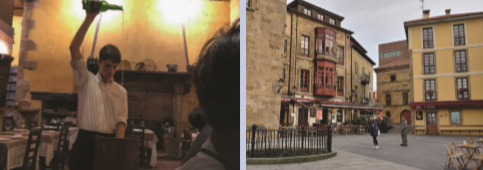/Review/
Break Away from Your Mundane Routine and Wing It in Spain

Lee Won-jun Reporter
Two months ago, my team (composed with 6 freshmans of Department of International Studies) and I applied to participate in an overseas fieldwork program, sponsored by the Jeonju Social Innovation Center. The main focus of the fieldwork was investigating precedent social innovation cases, which could be applied to Jeonju. Our topic was sustainable tourism and our field location was a small city on the far northwest coast of Spain, called Gijon, pronounced [Hee-heon].
During the Fall Semester, as soon as the mid-term exams had ended, our team departed on a journey to Spain. Leaving school in the middle of the semester was a challenge for many of us, who were missing classes. This story shares our overseas fieldwork experiences in Gijon over six days in September 2019.
After traveling for 22 hours, 14 hours in the plane to Madrid followed by eight hours on the train, we finally arrived at our destination, Gijon. It was about midnight when we arrived at our accommodation. After much needed rest, we started our fieldwork. Gijon is on the NW coast of Spain, facing the Atlantic Ocean. So we were near a beach and decided to go for a walk along the shore. There, we saw dogs and their owners going for their morning run. To our surprise, we did not see any trash, glass fragments or dog poop anywhere on the beach. It was so clean, compared to Korea’s famous beaches.
Following our morning exploration on the beach, we found lunch at a local cafe. We had to make random menu choices since we couldn’t read or understand the Spanish menu. Thankfully, what we ordered was quite good, though too salty. Next, we went to the old-town in Gijon, similar to Jeonju’s Hanok Village. The architecture in this historic part of the city is well preserved, with the buildings still in their original form.
After doing some of our research in the Old Town, we decided to explore some of the nightlife in Gijon, known to many as a silent, rural and eco-friendly town. I imagined it to be very dark, with empty and quiet streets at night. However, such expectations were dashed. As the sun set beneath the horizon over the sea, the street lights lit up, and a different city emerged. As we walked the streets, we could see the pubs and clubs were crowded with people.
We also enjoyed the night with ‘sidra,’ a well-liked apple liquor and popular beverage in Gijon. When serving this drink, the waiter raises one arm as high as possible to pour the cider into the glass held by the lower hand. It was a good drink to sample for me, though I found the taste to be similar to apple vinegar. I was satisfied to have had just a sample taste of it.
The following day, we had planned to survey more than 50 local residents and tourists in Gijon. Unfortunately, on that day, it rained heavily with strong, hard winds. Thus, we had no choice but to give up our survey. I was disappointed not to have completed the survey as we had planned. After the dark clouds lifted and the storm had passed, a rainbow appeared in the sky.
After the rain stopped, we could luckily survey locals and tourists. However, we coulnd’t reach our planned number of survey.
After our three-day visit in Gijon, we traveled to Madrid by train and stayed there for two days. There were many differences to compare between Gijon and Madrid. Gijon was a smaller, calmer, city with a relaxed atmosphere. It did not feel much like a tourist spot. Many of the locals could not speak nor understand English. This made it difficult to communicate with locals to order food or request information.
In contrast, Madrid is a much larger, busier and more complicated city to get around in. However, I found its residents to be more visitor-friendly, making it much easier to get around, asking directions or ordering food in English. One thing I learned in Spain: the food is rather salty (more than Korean food), so it would be good to learn the phrase, ‘un poco de sal, por favor,’ which basically translates to, ‘please put just a little salt in my food.’
As I mentioned previously, leaving my studies and traveling during the middle of the semester was a big challenge. However, I can confidently say that I learned more from traveling, than I would have in the classroom. So, if you hesitate to travel during the semester, I would say, “just wing it, go for it”. In my opinion, deviation from university in this way is the only chance to breakaway from a mundane routine. If you get a job later, it will be much harder to do this kind of spontaneous traveling. So, just wing it, worry about tomorrow, tomorrow.

